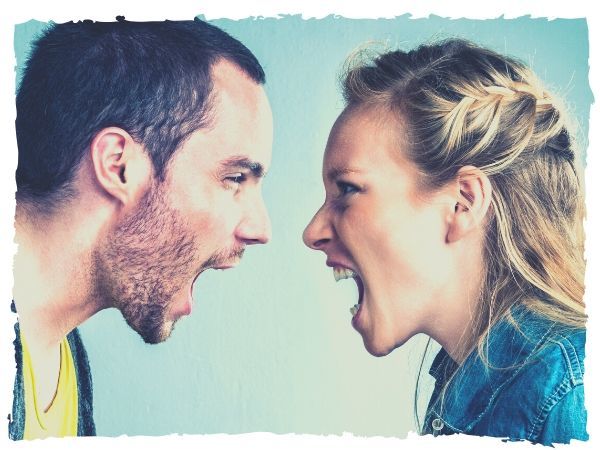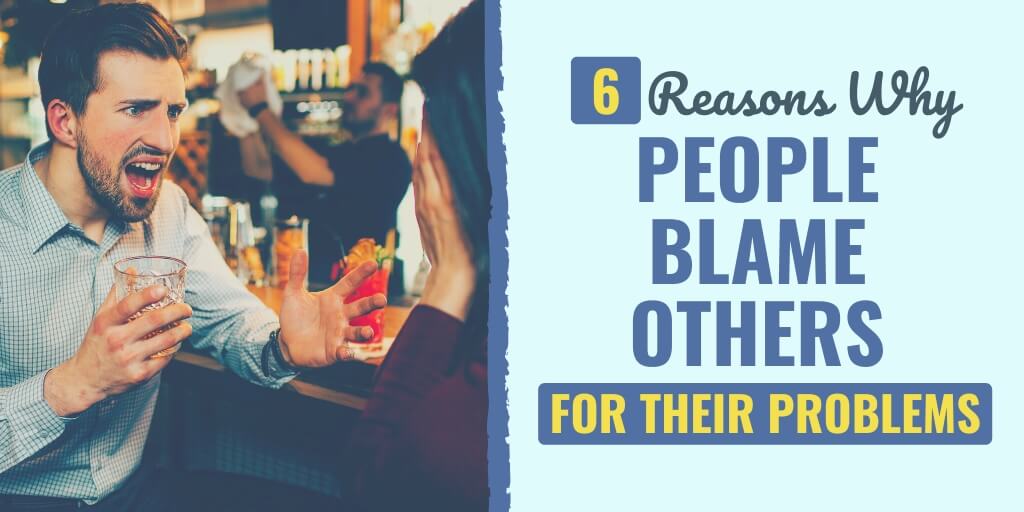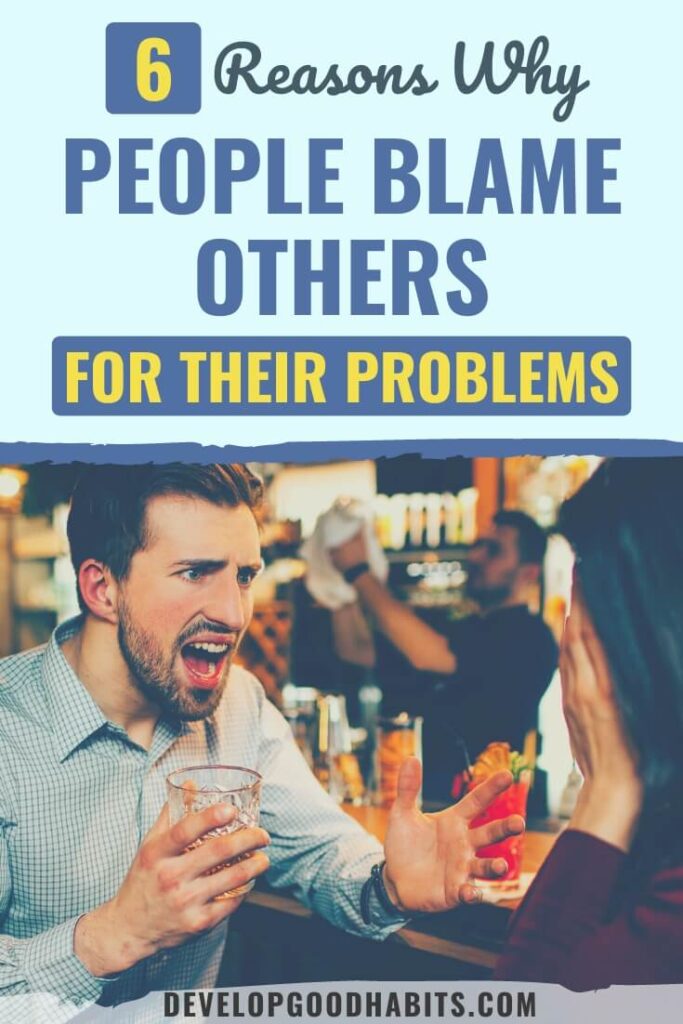How many times have you shown up late somewhere and blamed traffic?
Traffic is such an easy thing to blame when you rush into work ten minutes late. But is it really traffic’s fault that you’re late?
Blaming others for your own misfortunes–whether it’s another person or an external circumstance–is an easy way to outsource unwanted responsibility. People tend to play the blame game when they can’t see a better solution to their problem or can’t handle a personally distressing situation.
People who play the blame game believing it will benefit them in the long run are quite mistaken.
In fact, research shows that people who tend to look outside of themselves to place blame on others for their own mistakes tend to lose social status among their peers, have lower performance levels, and don’t learn as much when they run into obstacles in life. .
Do You Play the Blame Game?
Playing the blame game may come as second nature to people who are used to getting their way or those who live with a victim mentality. However, when you blame other people for anything that goes wrong in your life, you’re failing to maintain any sense of personal responsibility.
Further, studies have found that blaming others is actually contagious. In fact, just witnessing someone else blaming another person for a mistake is enough to cause the witness to blame others themselves for completely unrelated failures.
So why is it important to take ownership of your life’s circumstances?
Sociology experts have discovered that people who accept responsibility for the negative things in their lives are empowered, while those who feel like they are a victim to life’s circumstances are powerless.
This means that people who don’t play the blame game believe that they have a sense of control over the outcomes in their lives, while others believe that no matter what they do, other people or factors will determine their future.
If you had the choice to feel like a victim or feel empowered, which would you choose?
I’m going to assume that you would prefer to feel empowered, and one of the first steps to doing that is to stop blaming other people for your misfortunes.
In this article, we are going to look at six reasons why people blame others and steps you can take to personally overcome these reasons if you find yourself playing the blame game.
Let’s get started.
6 Reasons Why People Always Blame Others
1. Blaming people is easy.
Let’s start with the short and simple truth here. When you blame others, you’re lifting the accountability and responsibility off of yourself and passing the buck.
Doing this is a lot easier than having to handle the aftermath of being responsible for a problem–even if it’s just the emotional responsibility you have to carry for being at fault.
Sometimes you may be able to truly convince yourself that whatever is going on is someone else’s fault, but many times, deep down, you will know you’re lying. In the moment, however, it’s easier to lie than it is to face the truth.
When faced with a decision of whether to lie or not, people tend to weigh the chances of others finding out against the potential consequences of the truth and then take the easy route, whichever that may be.
Action Step: Reframe the situation as a chance to learn. Every mistake you make in life allows you to have an opportunity to learn and grow.
Next time you do something wrong, take a minute to consider what you could learn if you accepted personal responsibility for the problem.
This can help you prevent the problem from recurring. Also, if you blame instead of learning, you will remain in the same spot in your life, just maybe a bit more miserable because you consider yourself to be a victim of your circumstances and the people around you.
2. Blame works well as a defense mechanism.
If you don’t want to acknowledge your shortcomings or wrongdoings, it is easy to blame a poor outcome on someone else.
We use defense mechanisms such as blaming others to protect ourselves from potential feelings of guilt or anxiety because by shifting the blame onto someone else, you can sidestep the responsibility of reflecting on your own behavior.
Our defense mechanisms can kick into play subconsciously, and it’s normal for people to do things that they wouldn’t want to admit to in order to preserve their self-righteousness.
However, when this is done in excess, it becomes problematic and can lead someone to make excuses all the time rather than having a sense of personal responsibility.
Often coupled with denial, the defense mechanism of blaming others is used to avoid facing situations that may be too challenging to handle.
Action Step: Defense mechanisms are a learned behavior that can be replaced with new behaviors.
If you find yourself starting to feel anxious and using a defense mechanism such as blaming someone else, stop to think if taking responsibility for the situation you’re in would really impact you in the grand scheme of things.
Chances are that it won’t, and taking responsibility will feel better than the potential guilt that may arise.
3. Some people blame others if they feel themselves losing control.
It is easy to panic if you lose control of a situation, and often one way to feel like you’re regaining control is to blame other people.
For example, let’s say you’re in a heated argument with your spouse and you lose control of your emotions, leading you to say something extremely hurtful.
You may blame the comment you made on the fact that your spouse was being mean to you in the first place, when in reality, you felt powerless in the heat of the moment. (This is a common tactic used by gaslighters.)
Making the comment was a reaction to your anger, which was the emotion you were showing to mask the deeper feeling of powerlessness. Even though you have had arguments in the past, you may not want to acknowledge that there are problems in your marriage that need to be addressed.
In this scenario, you’re denying your personal responsibility for your behavior because you feel powerless over your actions and incapable of changing.
However, you’re not recognizing that blaming your spouse for your burst of outrage only made your sense of powerlessness even worse, which then increases your likelihood of blaming your spouse again.
Action Step: While an event or someone else’s behavior may contribute to your emotions, you can’t attribute the intensity of your feelings or your method of managing them to anyone aside from yourself.
If you feel like you’re losing control, stop. Breathe. Think about your next move before you make it. Remember that you’re the only one who actually has control over your behavior and therefore you will have to take personal responsibility for your next move.
4. Blaming others protects your fragile ego.
Blaming other people can act as a form of social comparison. If you place blame on someone else, it makes you feel like you are “right” and they are “wrong”.
Even when you blame other people to make yourself seem like a victim, you’re still trying to boost your ego because you’re seeking attention from other people to validate that you’re correct. This shows a sign of low self-esteem.
Action Step: Rather than trying to figure out why you’re blaming other people, go a step deeper than that and explore why you feel so bad about yourself that you feel the need to put other people down in order to lift yourself up.
Work on developing your sense of self-worth to help you learn to handle being responsible for yourself. Plus, the more you are willing to accept your own capacity for error, the more likely you will be to accept and understand it in other people as well.
5. People may play the blame game to help explain a situation.
When something goes wrong, you probably feel a need to explain why the problem happened, and oftentimes, blaming someone else helps people feel like they have located a cause.
People often assume that someone has to be at fault if there is a problem. But this results in snap judgements and people’s tendency to deny responsibility.

What people often fail to see is that most issues are a result of a context or system rather than people. People aren’t as lazy or incompetent as blamers claim them to be. Rather, several factors often come together to lead to a mistake.
Action Step: Accept the fact that some events are out of your control. You don’t need to have an explanation ready to tell other people for everything that happens.
Further, you won’t always be able to even understand all of the reasons why something goes wrong.
6. People blame others to help excuse their own actions.
Sometimes, blaming others can give us an excuse to hurt other people or act in a way that we wouldn’t normally act.
When you place blame on someone else, you may be trying to justify your actions to yourself to reduce your mind’s natural inhibitions to acting in a way that is socially unacceptable.
When you’re placing blame on others, you are able to create a pattern of thinking that lets you act in ways that you normally wouldn’t.
Let’s say someone cut you off in traffic and you then made the effort to catch up with them at a light so you could curse them out.
In this situation, you may justify your irrational behavior by saying the other person “started it” and you were just getting back at them for doing something just as bad to you. You’re trying to excuse your bad behavior by assigning a reason to it.
Action Step: Take responsibility for your actions. You’re an adult and completely capable of owning up to your mistakes. Instead of spending time and energy looking for ways to deny your mistakes, use that time and energy to learn from your downfalls.
Final Thoughts on Blaming Others
People often feel an unrealistic demand for perfection, leading them to blame others for their mistakes. When you play the blame game, you’re losing out on the opportunity for personal development.
Blame is an act of defense, and if you’re constantly defending yourself, you’re not opening yourself up to anything that other people have to offer you that could help you grow and learn.
It is one of the many destructive habits that you need to get rid of. If you want to learn how to break a bad habit, then the first step is to identify the habits that you hold you back. Watch the video below to learn more.
Start thinking of personal responsibility as a way to learn from your mistakes and the mistakes of others. Accept your tendency to make mistakes as a route toward personal development. Try to work toward doing things better, but rest assured that you live in a flawed world.
Finally, if you're looking for more resources, be sure to read these articles:
- 5 Ways to Stop Your Self Sabotaging Behavior
- 9 Habits to Be a More Responsible Person
- Accountability vs Responsibility: 5 Ways They Differ

Connie Mathers is a professional editor and freelance writer. She holds a Bachelor's Degree in Marketing and a Master’s Degree in Social Work. When she is not writing, Connie is either spending time with her daughter and two dogs, running, or working at her full-time job as a social worker in Richmond, VA.


